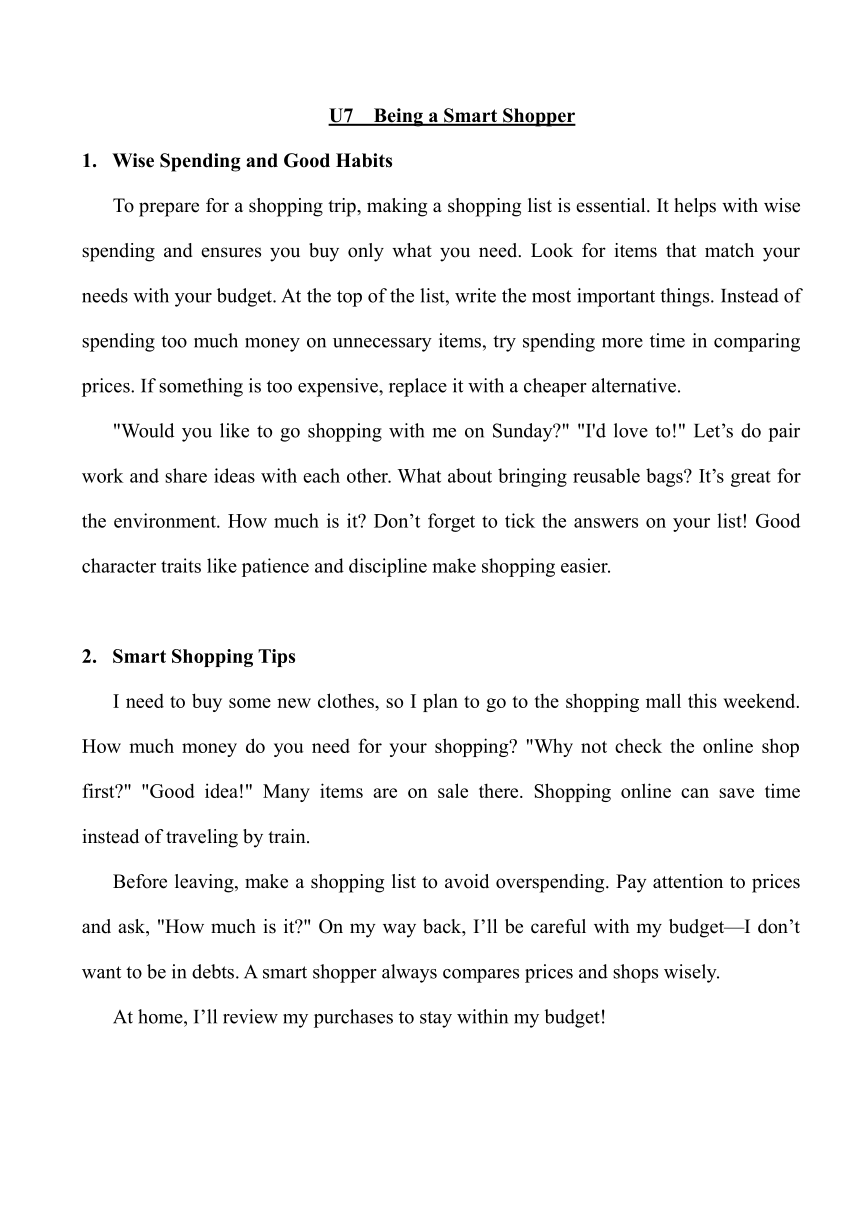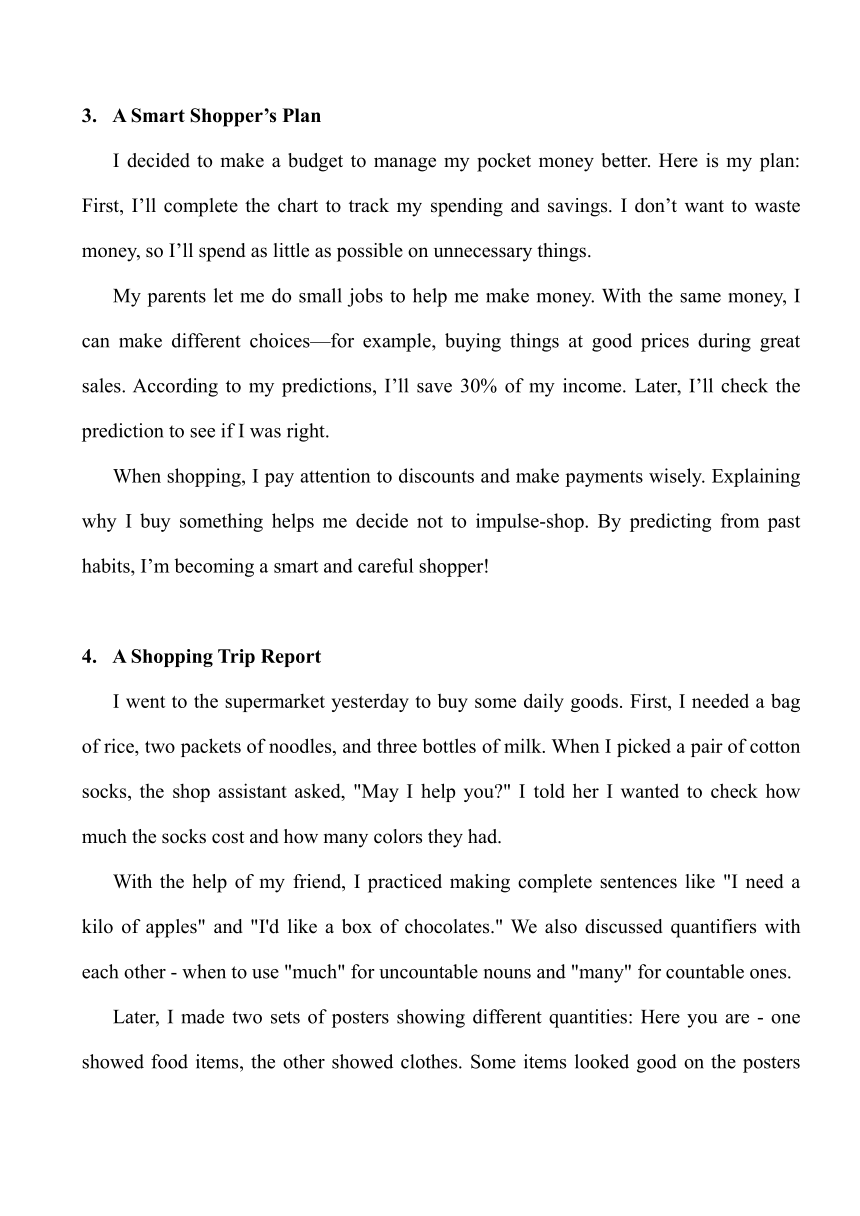期末Unit 7Being a Smart Shopper 通过短文记词组 仁爱科普版(2024)七年级下册
文档属性
| 名称 | 期末Unit 7Being a Smart Shopper 通过短文记词组 仁爱科普版(2024)七年级下册 |  | |
| 格式 | docx | ||
| 文件大小 | 17.1KB | ||
| 资源类型 | 教案 | ||
| 版本资源 | 仁爱科普版 | ||
| 科目 | 英语 | ||
| 更新时间 | 2025-07-01 12:43:26 | ||
图片预览


文档简介
U7 Being a Smart Shopper
Wise Spending and Good Habits
To prepare for a shopping trip, making a shopping list is essential. It helps with wise spending and ensures you buy only what you need. Look for items that match your needs with your budget. At the top of the list, write the most important things. Instead of spending too much money on unnecessary items, try spending more time in comparing prices. If something is too expensive, replace it with a cheaper alternative.
"Would you like to go shopping with me on Sunday " "I'd love to!" Let’s do pair work and share ideas with each other. What about bringing reusable bags It’s great for the environment. How much is it Don’t forget to tick the answers on your list! Good character traits like patience and discipline make shopping easier.
Smart Shopping Tips
I need to buy some new clothes, so I plan to go to the shopping mall this weekend. How much money do you need for your shopping "Why not check the online shop first " "Good idea!" Many items are on sale there. Shopping online can save time instead of traveling by train.
Before leaving, make a shopping list to avoid overspending. Pay attention to prices and ask, "How much is it " On my way back, I’ll be careful with my budget—I don’t want to be in debts. A smart shopper always compares prices and shops wisely.
At home, I’ll review my purchases to stay within my budget!
A Smart Shopper’s Plan
I decided to make a budget to manage my pocket money better. Here is my plan: First, I’ll complete the chart to track my spending and savings. I don’t want to waste money, so I’ll spend as little as possible on unnecessary things.
My parents let me do small jobs to help me make money. With the same money, I can make different choices—for example, buying things at good prices during great sales. According to my predictions, I’ll save 30% of my income. Later, I’ll check the prediction to see if I was right.
When shopping, I pay attention to discounts and make payments wisely. Explaining why I buy something helps me decide not to impulse-shop. By predicting from past habits, I’m becoming a smart and careful shopper!
A Shopping Trip Report
I went to the supermarket yesterday to buy some daily goods. First, I needed a bag of rice, two packets of noodles, and three bottles of milk. When I picked a pair of cotton socks, the shop assistant asked, "May I help you " I told her I wanted to check how much the socks cost and how many colors they had.
With the help of my friend, I practiced making complete sentences like "I need a kilo of apples" and "I'd like a box of chocolates." We also discussed quantifiers with each other - when to use "much" for uncountable nouns and "many" for countable ones.
Later, I made two sets of posters showing different quantities: Here you are - one showed food items, the other showed clothes. Some items looked good on the posters while others didn't. Finally, I used all this information to make a report about smart shopping!
Smart Shopping and Budgeting
Here is our shopping plan for this weekend. At the start of the month, we decided to try our best to save money. That way, we won't overspend at the end of the month.
"Let's do our shopping wisely," my friend suggested. First, we'll bring reusable bags - to save money, we take containers from home too. We checked prices and noticed some items were too expensive, so we'll buy alternatives that cost less.
In my exercise book, I drafted our essay about budgeting. It includes theme vocabulary like "discounts" and "bargains," as well as ways to present character traits of smart shoppers. I organized ideas into a well-balanced structure to express my views of wise spending.
Our teacher invited us to share our ratings of different stores. This activity helped improve our thinking skills about value for money. Finally, we'll wrap up the topic with tips for staying within budget!
A Fun Shopping Experience
Every time we go shopping during special holiday seasons, my friends and I make up conversations to practice English. It is great fun performing as customers and shop assistants! Next time, we plan to work with different partners for group work.
First, we complete the table with different kinds of items we need. Then we fill in the blanks of our shopping list. When we see an advertisement for discounts, we use it to save money. At the cashier, we wait for our turn to pay for purchases and check out.
Our teacher introduced some cultural knowledge about shopping customs worldwide. We made recordings of our role-plays and were satisfied with how realistic they sounded. Through these activities, we've become more interested in learning practical English!
Last week, we even created our own store performance to introduce traditional festival goods. The pair work helped us improve our communication skills while having fun!
Wise Spending and Good Habits
To prepare for a shopping trip, making a shopping list is essential. It helps with wise spending and ensures you buy only what you need. Look for items that match your needs with your budget. At the top of the list, write the most important things. Instead of spending too much money on unnecessary items, try spending more time in comparing prices. If something is too expensive, replace it with a cheaper alternative.
"Would you like to go shopping with me on Sunday " "I'd love to!" Let’s do pair work and share ideas with each other. What about bringing reusable bags It’s great for the environment. How much is it Don’t forget to tick the answers on your list! Good character traits like patience and discipline make shopping easier.
Smart Shopping Tips
I need to buy some new clothes, so I plan to go to the shopping mall this weekend. How much money do you need for your shopping "Why not check the online shop first " "Good idea!" Many items are on sale there. Shopping online can save time instead of traveling by train.
Before leaving, make a shopping list to avoid overspending. Pay attention to prices and ask, "How much is it " On my way back, I’ll be careful with my budget—I don’t want to be in debts. A smart shopper always compares prices and shops wisely.
At home, I’ll review my purchases to stay within my budget!
A Smart Shopper’s Plan
I decided to make a budget to manage my pocket money better. Here is my plan: First, I’ll complete the chart to track my spending and savings. I don’t want to waste money, so I’ll spend as little as possible on unnecessary things.
My parents let me do small jobs to help me make money. With the same money, I can make different choices—for example, buying things at good prices during great sales. According to my predictions, I’ll save 30% of my income. Later, I’ll check the prediction to see if I was right.
When shopping, I pay attention to discounts and make payments wisely. Explaining why I buy something helps me decide not to impulse-shop. By predicting from past habits, I’m becoming a smart and careful shopper!
A Shopping Trip Report
I went to the supermarket yesterday to buy some daily goods. First, I needed a bag of rice, two packets of noodles, and three bottles of milk. When I picked a pair of cotton socks, the shop assistant asked, "May I help you " I told her I wanted to check how much the socks cost and how many colors they had.
With the help of my friend, I practiced making complete sentences like "I need a kilo of apples" and "I'd like a box of chocolates." We also discussed quantifiers with each other - when to use "much" for uncountable nouns and "many" for countable ones.
Later, I made two sets of posters showing different quantities: Here you are - one showed food items, the other showed clothes. Some items looked good on the posters while others didn't. Finally, I used all this information to make a report about smart shopping!
Smart Shopping and Budgeting
Here is our shopping plan for this weekend. At the start of the month, we decided to try our best to save money. That way, we won't overspend at the end of the month.
"Let's do our shopping wisely," my friend suggested. First, we'll bring reusable bags - to save money, we take containers from home too. We checked prices and noticed some items were too expensive, so we'll buy alternatives that cost less.
In my exercise book, I drafted our essay about budgeting. It includes theme vocabulary like "discounts" and "bargains," as well as ways to present character traits of smart shoppers. I organized ideas into a well-balanced structure to express my views of wise spending.
Our teacher invited us to share our ratings of different stores. This activity helped improve our thinking skills about value for money. Finally, we'll wrap up the topic with tips for staying within budget!
A Fun Shopping Experience
Every time we go shopping during special holiday seasons, my friends and I make up conversations to practice English. It is great fun performing as customers and shop assistants! Next time, we plan to work with different partners for group work.
First, we complete the table with different kinds of items we need. Then we fill in the blanks of our shopping list. When we see an advertisement for discounts, we use it to save money. At the cashier, we wait for our turn to pay for purchases and check out.
Our teacher introduced some cultural knowledge about shopping customs worldwide. We made recordings of our role-plays and were satisfied with how realistic they sounded. Through these activities, we've become more interested in learning practical English!
Last week, we even created our own store performance to introduce traditional festival goods. The pair work helped us improve our communication skills while having fun!
同课章节目录
